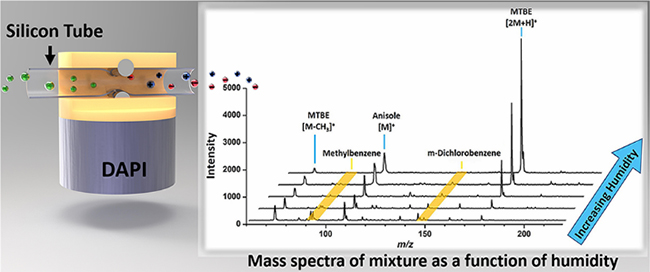Discontinuous atmospheric pressure interface (DAPI), consisting of a pinch valve, a silicone tube, and two metal capillaries, is a common inlet for miniature ion trap mass spectrometers (ITMS). It can improve the transport efficiency while help the miniaturization of the mass spectrometers.
DAPI-ITMS is widely used for drug detection, metabolomics analysis and environmental applications.
Recently, a research group led by Prof. LI Haiyang from the Dalian Institute of Chemical Physics (DICP) of the Chinese Academy of Sciences (CAS) discovered a new ionization phenomenon known as triboionization inside the silicone tube of the DAPI. In the phenomenon, analytes could still be detected with no extra ionization source in a DAPI-ITMS.
This study was published in Analytical Chemistry on November 24.

The schematic diagram of DAPI and mass spectra of mixture as a function of humidity (Image by XU Chuting and RUAN Huiwen)
The researchers confirmed that the friction on the inner surface of silicone tube could induce ionization during the opening of the DAPI. And they improved the ionization efficiency of DAPI-ITMS by changing the material and roughness of inner surface of the silicone tube in the DAPI.
Moreover, they found that by increasing the number and the frequency during the on/off of the pinch valve of the DAPI, the signal intensity of ITMS could be improved by nearly 20 times.
"We have applied this triboionization to detect the ketones on the inner wall of silicone tube after continuous enrichment," said Prof. LI. "This work proposed an ionization source which needs no light, heat, radiation, and electric supply."
The above work was supported by Innovation Foundation of DICP and Natural Science Foundation of Liaoning Province. (Text by XU Chuting and RUAN Huiwen)